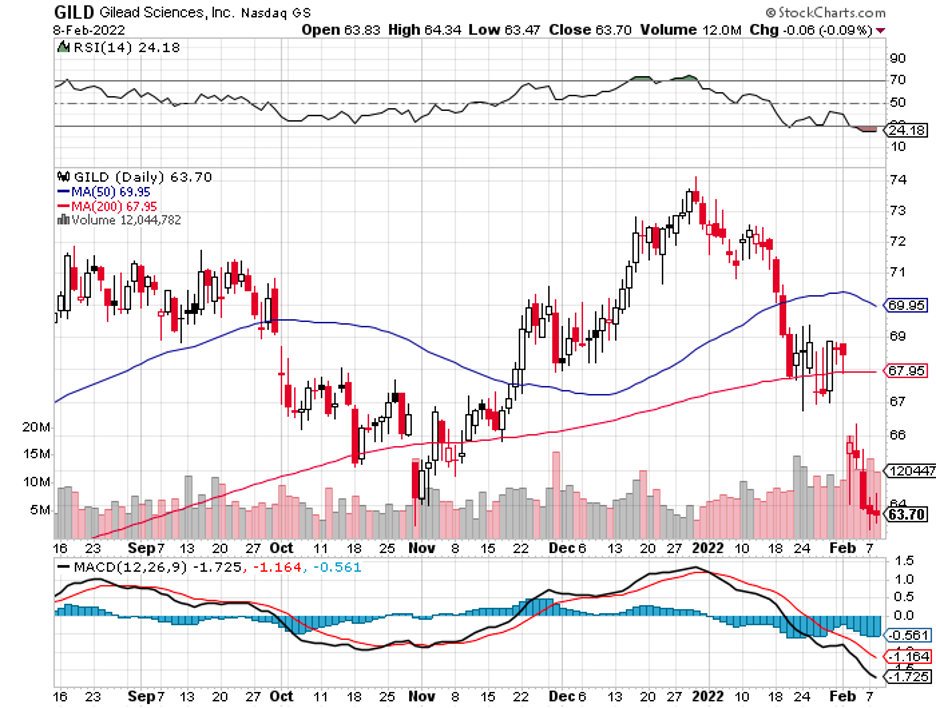A Healthcare Enigma to Add to Your Watchlist
The top names in the biopharmaceutical world based on their market capitalization include Johnson & Johnson (JNJ), Pfizer (PFE), AbbVie (ABBV), Eli Lilly (LLY), Merck (MRK), Bristol Myers Squibb (BMY), Amgen (AMGN), and Gilead Sciences (GILD).
Among these names, Gilead is often viewed as an enigma, given its history and the challenge in predicting its share price trajectory.
Over the past months, Gilead has been testing the patience of investors. In fact, the company is projected to experience a fall in revenues this year from $27 billion in 2021 to $24.05 billion in 2022.
The latest news that added to their anxiety was the pause on clinical trials for its cancer therapy, Magrolimab.
This came after its short-lived dominance in the Hepatitis C segment.
At that time, the sales of its leading drug Sovaldi skyrocketed from $140 million in 2013 to a jaw-dropping $10.2 billion by 2014.
Meanwhile, another Hepatitis C treatment, Harvoni, single handedly raked in $13.8 billion in sales in 2015, pushing the entire company’s revenues to an impressive $32.6 billion.
Unfortunately for Gilead, it became the victim of its own staggering success.
Its Hepatitis C treatments, Sovaldi and Harvoni, were incredibly effective and managed to cure the patients within months. The demand for these drugs fell because the patient pool gradually ran dry.
By 2019, the Hepatitis C franchise of the company had declined and managed to scrape $2.9 billion in combined sales.
Since then, though, the company has been struggling to regain investors' faith.
Nevertheless, these recent developments are not enough reasons to panic. If anything, Gilead has simply become even more attractively priced due to the fallout.
In 2020, Gilead managed to report its first year-on-year increase in revenues since its glory days in 2015.
As the COVID-19 pandemic started to take hold of the world, it was Gilead’s Veklury (Remdesivir) that secured the first-ever Emergency Use Authorization from the FDA.
While Veklury was eventually overshadowed by COVID-19 vaccines from Pfizer, Moderna (MRNA), JNJ, and AstraZeneca (AZN), as well as other treatments and antibody cocktails from Eli Lilly, Regeneron (REGN), and Merck, Gilead’s candidate managed a comeback by the fourth quarter of 2021 after experts declared it to be effective against the Omicron strain.
In effect, Veklury had a major impact on the company’s 2021 performance, recording $5.6 billion in annual sales.
Although this is not as illustrious or groundbreaking as its Hepatitis C treatments, the reemergence of Gilead as a frontrunner in the pandemic is proof that the company has not lost its knack for discovering and developing a winning formula for blockbuster treatments.
Another avenue that Gilead has been exploring is actively acquiring assets to expand its portfolio.
One notable move in that direction is its $11.9 billion acquisition of Kite Pharma, a leader in the cell therapy space, in 2017. Thus far, this agreement has yielded two drugs: Yescarta and Tecartus.
Since oncology is one of Gilead’s major areas of concentration, the commercialization of these two treatments conveys a promising future.
While both are yet to become blockbusters, the field of cell therapy has been rapidly expanding and turning into a critical therapeutic option for certain patient categories.
Yescarta is projected to rake in $1.5 billion in revenues if it receives the FDA green light for large B-cell lymphoma
Considering that its last trial data showed off a 60% improvement with Yescarta compared to standard of care in terms of halting the disease’s progression or even death, there’s a huge possibility that Gilead will be delivering good news soon.
As for Tecartus, this treatment received approval for acute lymphoblastic leukemia last year and is aiming to expand to cover mantle cell lymphoma by July 2022.
With its list price of $373,000, this CAR-T therapy is projected to reach blockbuster status in the following months as well.
Another oncology drug anticipated to reach blockbuster status soon is metastatic triple-negative breast cancer treatment Trodelvy, which Gilead gained access to following a $21 billion deal with Immunomedics in 2020.
Given its current approved indications and the queued trials to expand its coverage, Trodelvy is projected to reach $4.7 billion in peak sales.
Going back to the 2022 revenue forecast for Gilead, I think the change is from the company’s anticipated decline in Veklury sales.
Since Pfizer, BioNTech (BNTX), Novavax (NVAX), and Moderna have been actively working on Omicron-focused vaccines and treatments, Gilead expects its Veklury revenues to shrink as well.
Overall, Gilead still presents an excellent opportunity for long-term investors.
Despite its setbacks, the company has proven that it still holds the knack of rolling out remarkable and effective best-in-class treatments.
Moreover, its pipeline is filled with promising candidates poised to deliver in the years to come. So, don’t be too quick to write off Gilead just yet.



